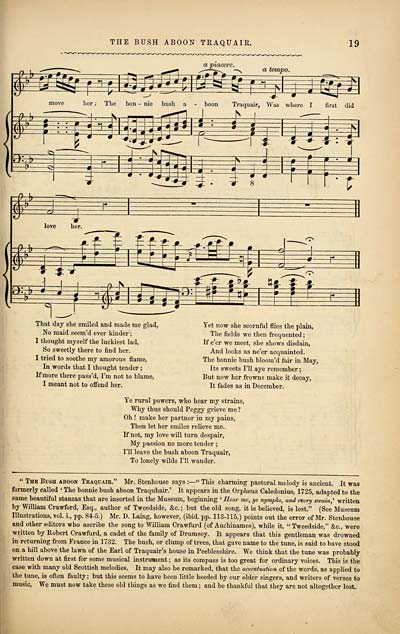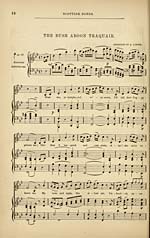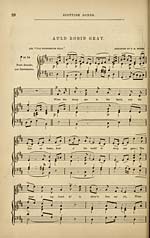Inglis Collection of printed music > Printed music > Songs of Scotland adapted to their appropriate melodies > Volume 1
(35) Page 19
Download files
Complete book:
Individual page:
Thumbnail gallery: Grid view | List view

THE BUSH ABOON TEAQUAIR.
move her ; The bon - nie bush a - boon Traquair, Was where I first did
i^^Wf^l
e^
f
I
^=
n
love her.
r?t>t£f
te ^H ^jy 1 ^^^^
That day she smiled and made me glad,
No maid seem'd ever kinder ;
I thought myself the luckiest lad,
So sweetly there to find her.
I tried to soothe my amorous flame,
In words that I thought tender ;
If more there pass'd, I'm not to blame,
I meant not to offend her.
Yet now she scornful flies the plain,
The fields we then frequented ;
If e'er we meet, she shows disdain,
And looks as ne'er acquainted.
The bonnie bush bloom 'd fair in May,
Its sweets I'll aye remember ;
But now her frowns make it decay,
It fades as in December.
Ye rural powers, who hear my strains,
Why thus should Peggy grieve me ?
Oh ! make her partner in my pains,
Then let her smiles relieve me.
If not, my love will turn despair,
My passion no more tender ;
I'll leave the bush aboon Traquair,
To lonely wilds I'll wander.
" The Bush aboon Traquaik." Mr. Stenhouse says : — " This charming pastoral melody is ancient. It was
formerly called ' The bonnie bush aboon Traquhair.' It appears in the Orpheus Caledonius, 1725, adapted to the
same beautiful stanzas that are inserted in the Museum, beginning ' Hear me, ye nymphs, and every swain, 1 written
by William Crawford, Esq., author of Tweedside, &c. ; but the old song, it is believed, is lost." (See Museum
Illustrations, vol. i., pp. 84-5.) Mr. D. Laing, however, (ibid. pp. 113-115,) points out the error of Mr. Stenhouse
and other editors who ascribe the song to William Crawfurd (of Auchinames), while it, " Tweedside " &c. were
written by Robert Crawfurd, a cadet of the family of Drumsoy. It appears that this gentleman was drowned
in returning from France in 1732. The bush, or clump of trees, that gave name to the tune, is said to have stood
on a hill above the lawn of the Earl of Traquair's house in Peeblesshire. We think that the tune was probably
written down at first for some musical instrument ; as its compass is too great for ordinary voices. This is the
case with many old Scottish melodies. It may also be remarked, that the accentuation of the words, as applied to
the tune, is often faulty ; but this seems to have been little heeded by our older singers, and writers of verses to
music. We must now take these old things as we find them ; and be thankful that they are not altogether lost.
move her ; The bon - nie bush a - boon Traquair, Was where I first did
i^^Wf^l
e^
f
I
^=
n
love her.
r?t>t£f
te ^H ^jy 1 ^^^^
That day she smiled and made me glad,
No maid seem'd ever kinder ;
I thought myself the luckiest lad,
So sweetly there to find her.
I tried to soothe my amorous flame,
In words that I thought tender ;
If more there pass'd, I'm not to blame,
I meant not to offend her.
Yet now she scornful flies the plain,
The fields we then frequented ;
If e'er we meet, she shows disdain,
And looks as ne'er acquainted.
The bonnie bush bloom 'd fair in May,
Its sweets I'll aye remember ;
But now her frowns make it decay,
It fades as in December.
Ye rural powers, who hear my strains,
Why thus should Peggy grieve me ?
Oh ! make her partner in my pains,
Then let her smiles relieve me.
If not, my love will turn despair,
My passion no more tender ;
I'll leave the bush aboon Traquair,
To lonely wilds I'll wander.
" The Bush aboon Traquaik." Mr. Stenhouse says : — " This charming pastoral melody is ancient. It was
formerly called ' The bonnie bush aboon Traquhair.' It appears in the Orpheus Caledonius, 1725, adapted to the
same beautiful stanzas that are inserted in the Museum, beginning ' Hear me, ye nymphs, and every swain, 1 written
by William Crawford, Esq., author of Tweedside, &c. ; but the old song, it is believed, is lost." (See Museum
Illustrations, vol. i., pp. 84-5.) Mr. D. Laing, however, (ibid. pp. 113-115,) points out the error of Mr. Stenhouse
and other editors who ascribe the song to William Crawfurd (of Auchinames), while it, " Tweedside " &c. were
written by Robert Crawfurd, a cadet of the family of Drumsoy. It appears that this gentleman was drowned
in returning from France in 1732. The bush, or clump of trees, that gave name to the tune, is said to have stood
on a hill above the lawn of the Earl of Traquair's house in Peeblesshire. We think that the tune was probably
written down at first for some musical instrument ; as its compass is too great for ordinary voices. This is the
case with many old Scottish melodies. It may also be remarked, that the accentuation of the words, as applied to
the tune, is often faulty ; but this seems to have been little heeded by our older singers, and writers of verses to
music. We must now take these old things as we find them ; and be thankful that they are not altogether lost.
Set display mode to: Large image | Transcription
Images and transcriptions on this page, including medium image downloads, may be used under the Creative Commons Attribution 4.0 International Licence unless otherwise stated. ![]()
| Special collections of printed music > Inglis Collection of printed music > Printed music > Songs of Scotland adapted to their appropriate melodies > Volume 1 > (35) Page 19 |
|---|
| Permanent URL | https://digital.nls.uk/94707392 |
|---|
| Shelfmark | Ing.127 |
|---|---|
| Additional NLS resources: | |
| Attribution and copyright: |
|
| Description | Scottish and English songs, military music and keyboard music of the 18th and 19th centuries. These items are from the collection of Alexander Wood Inglis of Glencorse (1854 to 1929). Also includes a few manuscripts, some treatises and other books on the subject. |
|---|
| Description | The Glen Collection and the Inglis Collection represent mainly 18th and 19th century Scottish music, including Scottish songs. The collections of Berlioz and Verdi collected by bibliographer Cecil Hopkinson contain contemporary and later editions of the works of the two composers Berlioz and Verdi. |
|---|

